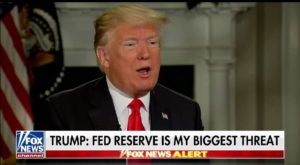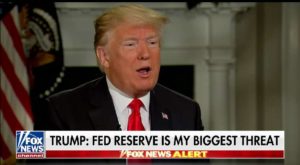
When it comes to Federal Reserve policy, we need to focus our worries on the correct thing. Hint: It’s not inflation. Also, it’s not recession. Also, It’s not the rate of interest rate hikes.

It’s the Fed’s independence. Even President Trump agrees with me. Although admittedly, for reasons diametrically opposed to my reasons.
In recent weeks, President Trump has ramped up his attacks on the Federal Reserve. Trump told Fox News that “my biggest threat is the Fed.” Also, that the Fed is “loco,” and he’s unhappy “because the Fed is raising rates too fast, and it’s too independent.”
After three interest rate hikes earlier in 2018, the Federal Reserve will raise short-term interest rates one more time this year. The Fed will likely rise another 1 percent over the next two years, according to their future guidance, and barring unexpected developments like war or recession.
The fact that Trump is unhappy is not particularly surprising. In fact, White House grumbling about the Federal Reserve is a common enough theme over the last eighty years. Not using Trump’s uniquely colorful language, mind you, but it’s still not wholly new.
History of Presidential Jawboning
Political leaders in power always want pro-growth policies. Low unemployment and high asset prices tend to make leaders look good. Presidents generally don’t want the Federal Reserve to – in Fed Chairman’s William McChesney Martin’s famous phrase “take away the punch bowl just as the party is getting started.” President Nixon reportedly blamed his 1960 loss to Kennedy as a result of Fed Chairman Martin’s tight monetary policy of high interest rates.
President Johnson complained as well, saying “Martin, my boys are dying in Vietnam, and you won’t print the money I need.”
President Nixon reportedly both put pressure on Martin’s successor at the Federal Reserve Arthur Burns to keep interest rates low and money flowing during his 1972 re-election, which he handily won. Paul Volcker, Fed Chairman during the 1980’s, published a book in late October 2018 in which he claims President Reagan’s Chief of Staff James Baker told him in 1984: “The president is ordering you not to raise interest rates before the election.” Volcker adds to the story that the Federal Reserve at the time had no plan to raise interest rates.
















